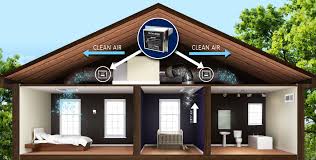
Heating and cooling your home are essential for comfort, but they can also become costly, particularly during extreme weather conditions. Fortunately, there are several energy-efficient HVAC upgrades that can help reduce your energy bills while maintaining a comfortable indoor environment. These upgrades not only increase the efficiency of your HVAC system but also contribute to long-term savings and sustainability.
Why Should You Consider Energy-Efficient HVAC Upgrades?
Upgrading your HVAC system is more than just a way to improve comfort; it’s an investment in efficiency. As HVAC systems age, they become less effective at maintaining your home’s temperature, leading to higher energy consumption and, consequently, increased utility costs. By investing in energy-efficient HVAC upgrades, you ensure your system operates optimally, using less energy while providing the same level of comfort. Over time, these upgrades can save significant amounts on energy bills.
What Are High-Efficiency HVAC Systems?
High-efficiency HVAC systems are designed to reduce energy consumption by operating more effectively and using less electricity. These systems typically come with higher Seasonal Energy Efficiency Ratio (SEER) ratings, which indicate their ability to cool or heat your home with minimal energy. For optimal efficiency, look for systems with a SEER rating of 16 or higher. Such systems are capable of significantly lowering energy costs while maintaining the desired indoor temperature.
How Smart Thermostats Contribute to Energy-Efficient HVAC Upgrades
One of the simplest yet most effective energy-efficient HVAC upgrades is installing a smart thermostat. These devices learn your daily routines and adjust the temperature automatically, ensuring the HVAC system only works when needed. For instance, the thermostat can lower the temperature when you’re not home, reducing unnecessary energy consumption. Many smart thermostats are also controllable remotely via smartphone apps, giving you full control over your system even when you’re away.
The Importance of Duct Sealing for Efficiency
Leaky ducts are a significant cause of energy loss in many HVAC systems. When ducts leak, air meant to heat or cool your home escapes through small gaps, forcing your HVAC system to work harder to maintain the temperature. This not only decreases system efficiency but also drives up your energy bills. Duct sealing is a simple yet effective upgrade that prevents air leaks, improving system performance by up to 20%. Sealing ducts ensures air stays where it’s needed, resulting in lower energy usage and a more efficient HVAC system.
How Insulation Upgrades Can Improve HVAC Efficiency
Good insulation plays a key role in maintaining indoor temperature stability. Without proper insulation, your HVAC system has to work harder to keep your home comfortable, leading to increased energy consumption. Upgrading your home’s insulation, particularly in areas like the attic or walls, allows your HVAC system to operate more efficiently by reducing the workload. With improved insulation, your HVAC system can maintain the desired temperature with less energy, thus reducing your overall energy bills.
What Are Variable Speed Motors and How Do They Help?
Traditional HVAC systems operate at a single speed: on or off. However, HVAC systems with variable-speed motors can adjust their speed based on the heating or cooling needs of your home. These systems provide a more consistent airflow and use less energy compared to traditional systems, which switch on and off at full speed. Over time, this results in reduced wear and tear on the system, enhancing its lifespan and cutting down on energy costs. Variable-speed motors are a great energy-efficient HVAC upgrade that leads to smoother operation and lower utility bills.
The Benefits of Zoned HVAC Systems
A zoned HVAC system allows you to control the temperature in different areas, or “zones,” of your home independently. This is especially useful in larger homes or spaces with varying temperature requirements. For example, you can reduce heating or cooling in rooms that aren’t used frequently, focusing energy only on the areas where you spend the most time. Zoned systems are an excellent way to avoid heating or cooling unused spaces, significantly lowering energy waste and cutting down on your monthly energy costs.
How Energy Recovery Ventilators Contribute to Energy-Efficient HVAC Upgrades
Energy Recovery Ventilators (ERVs) are another valuable upgrade for improving HVAC system efficiency. ERVs work by bringing fresh air into your home while minimizing the loss of conditioned air. In the winter, ERVs trap warm air and bring in fresh cold air, and in the summer, they help retain cool air. This results in less energy usage by your HVAC system as it doesn’t have to work as hard to adjust the temperature. Additionally, ERVs also help improve indoor air quality by continuously circulating fresh air.
Why Choose ENERGY STAR-Rated HVAC Systems?
When looking for a new HVAC system, one of the best indicators of energy efficiency is the ENERGY STAR label. ENERGY STAR-rated systems meet strict guidelines for energy performance and use less energy compared to conventional models. These systems are thoroughly tested to ensure they operate at peak efficiency, which results in substantial savings on energy bills. By choosing an ENERGY STAR-rated HVAC system, you’re making an environmentally conscious choice that will benefit both your budget and the planet.
Can Solar Power Assist with HVAC Costs?
For those looking to go green and further reduce energy consumption, solar power is an excellent option. Solar panels can be used to power your HVAC system, particularly during sunny months when your system is in use the most. Although the initial cost of installing solar panels may be high, the long-term savings on energy bills can make it a worthwhile investment. Solar power not only helps reduce your reliance on traditional electricity sources but also lowers your overall HVAC operational costs.
Conclusion
Upgrading your HVAC system is one of the most effective ways to lower your energy bills and reduce your carbon footprint. Whether you’re installing a smart thermostat, upgrading to a high-efficiency HVAC system, or adding insulation, these improvements lead to long-term savings. By making these energy-efficient upgrades, you can enjoy a more comfortable home while also contributing to a greener, more sustainable future.
If you’re considering energy-efficient HVAC upgrades, it’s worth consulting with a professional HVAC contractor to explore the best options for your home. With the right upgrades, you’ll not only reduce energy costs but also improve the overall performance and lifespan of your HVAC system.
Follow Article Fun for updates.




